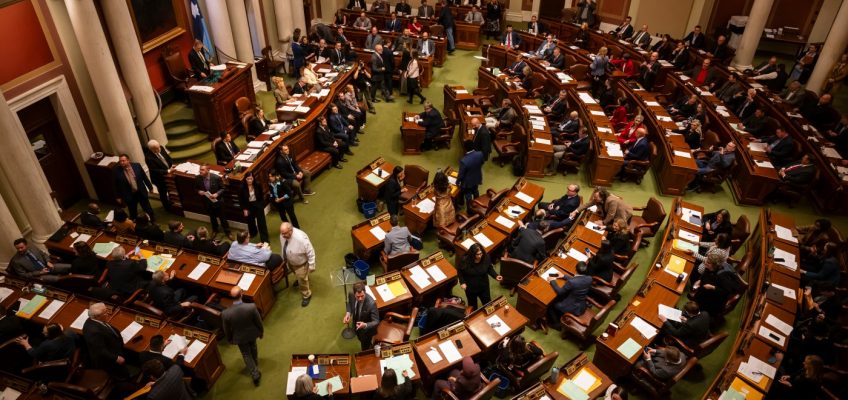Sam Nordquist was just 15 when Olivia McIntosh, his friend and fellow classmate at Face to Face Academy on St. Paul’s East Side, was killed in a quadruple homicide in 2017.
The school of 100 students was devastated by the news of the 17-year-old’s death, said Darius Husain, the school’s executive director.
A photo of Olivia McIntosh, 17, Maria McIntosh, 19, Wade McIntosh, 47 victims of a triple homicide sits on an easel prior to a balloon release and ceremony was held on Saturday, April 7, 2018, one year after Wade McIntosh, and his daughters Maria, 19, and Olivia 17 were killed in St. Paul’s Payne-Phalen area by Maria’s ex-boyfriend, Jeffrey Jamaile Taylor, on April 17, 2018. (Ginger Pinson / Pioneer Press)
Nordquist helped school officials “determine a path forward to honor Olivia’s memory — and to not let Olivia’s memory be just about how she died so tragically,” Husain said. “He was an integral part of working with the family in trying to find some sort of positive way and positive direction that we could deal with our grief and start the healing process. I think that was a really seminal moment in Sam’s life, being 15 and having to go through that experience.”
Now, almost eight years later, Face to Face officials are working with Nordquist’s family on ways to honor Nordquist, a transgender man who was found dead in New York state on Feb. 13 after having been tortured and killed.
On Thursday, school officials — with the blessing of Linda Nordquist, Sam’s mother — announced the creation of the “Stand with Sam Scholarship Fund” at the school and the creation of a memorial garden on the grounds of the school on the East Side of St. Paul.
As with McIntosh, school officials are reeling from the news of Nordquist’s death, Husain said.
“The circumstances of Sam’s death are beyond a tragedy and are indescribable,” Husain wrote in a note to the school community. “I chose the term ‘indescribable’ because there exist no appropriate words to properly communicate what was inflicted upon Sam in the last months of his life. Such was the extent of the injustice, the story has drawn national attention. The articles are extremely difficult and disturbing to read.”
“To think this could happen to any human being, let alone a very kind-hearted and loving member of our school community,” Husain wrote. “There are also no adequate words for this feeling.”
Details from New York
New York State Police charged five people on Feb. 14 with murder in the killing of Nordquist, who had been missing since December. Authorities said Nordquist died following repeated acts of violence and torture for more than a month by multiple individuals who later discarded his body in a field.
Nordquist arrived in New York in late September and was expected to return home to Minnesota about two weeks later, but he never boarded his return flight and later lost contact with loved ones, police said.
Police began investigating Nordquist’s disappearance on Feb. 9 after receiving a request for a welfare check from his family, who told the authorities that they had lost contact with him at the end of January.
At Face to Face Academy
Face to Face Academy is a charter high school that works with students who have “fallen through the cracks” at other schools, Husain said. Founded in 1998, the school works with about 100 students ranging in age from 14 to 21.
Some students have gotten behind in credits at other schools and are “really staring at some pretty major obstacles and challenges towards earning their diploma,” Husain said. “It’s a real success story because not only do students get back on track with their education, they actually grow and thrive. They get to be their best selves here at the school.”
Undated courtesy photo, circa Feb. 2025, of Face to Face Academy. located at 1165 Arcade St. in St. Paul. (Courtesy of Face to Face Academy)
Nordquist came to the school in 2016 and immediately “found his people,” Husain said. “He found his community. He found a place where he could be dignified. He had gone to a couple other high schools before he found Face to Face, but it was really at Face to Face where he put down his roots and was able to find a great deal of success.”
Nordquist, a member of the school’s community leadership class, enthusiastically participated in school activities and had a great sense of humor, Husain said. For instance, when he learned that Santa was coming to Face to Face Academy as part of a holiday event, Sam, “barely 5-feet tall,” volunteered to be an elf, Husain said.
“He said, ‘Well, if Santa is coming, I’m going to be the elf,’” Husain said. “He put on a pair of pointy ears, stood by Santa’s side and handed out cookies — all while convincing the younger children he was from the North Pole. He was a jester and a prankster — always setting up the next laugh with his Cheshire cat grin.”
Nordquist volunteered at many different “spaces and places,” Husain said. “He had so much empathy for other people. If you talk to Sam’s friends or his teachers, they will talk about how he really just felt so strongly and connected to people who were in need, and that and that showed through. Sam had his own challenges, and his family had gone through quite a bit themselves, but he used those experiences to show empathy for others who were in need.”
When Face to Face Health & Counseling, the partner organization of Face to Face Academy, was forming an advisory council, Nordquist was one of the first to apply, Husain said.
In his senior speech, Nordquist called Face to Face “his forever school,” he said. “He had gone to a couple other high schools before he found Face to Face, but it was really here where he put down his roots and had success. He was able to find a community of people who loved him and accepted him.”
Last August, Nordquist returned to the school for a visit.
“He wanted to give us an update on how he was doing and wanted to let us know how excited he was for the next chapter in his life,” Husain said. “We’re a tight-knit, close community, and we are always here to listen and to support, and Sam took us up on that, and what a gift that was. He was excited to start living his ‘most authentic life’ and optimistic about his future.”
Message to students
Husain said he talked this week with students about Nordquist.
“My message to each and every one of them was to let them know that our commitment to them goes beyond their education and their physical time here at Face to Face and beyond them earning their diploma,” he said. “Our commitment extends forever. This will always be a place of support for them. This will always be a place where they can come back to and, you know, tell us about their successes and, and ask for help if they need it.”
Feds get eighth guilty plea in smuggling ring that mailed fentanyl in stuffed animals
St. Paul firefighters find man dead after extinguishing garage fire in North End
Charges: DNA ties three St. Paul sexual assaults to 18-year-old man
St. Paul City Council deadlocks around Ryan Cos. plan to add one-story buildings along Ford Parkway
Breakaway Music Festival will return to St. Paul’s Allianz Field in June
Husain said he met with Linda Nordquist, Sam’s mother, on Thursday to finalize plans for the “Stand with Sam Scholarship Fund” and a marker for the school’s new memorial garden.
“Sam was a member of our community, and we stand up for the members of our community,” he said. “No family should have to carry this burden, but we want them to know they’re not going to be alone.”
The memorial garden is being planned as part of the school’s new outdoor and experiential learning space, Husain said. The memorial garden will be designed by students, staff, and families as a quiet place of meditation, remembrance, and healing. With the blessing of Nordquist’s family, a marker will be arranged in the garden in honor of Sam “providing community members an opportunity to reflect on his impactful life and story,” he said.
The “Stand with Sam” scholarship will honor graduating seniors from Face to Face Academy who are “actively involved in community service, promote a positive and welcoming school culture, and serve as an advocate for individuals and groups most in need,” Husain said.
A GoFundMe online fundraiser for the Nordquist family had raised more than $140,000 as of Thursday night.
“There’s a tremendous amount of energy, in a way that I have never seen before, to do something positive in Sam’s memory,” Husain said. “We’re conscientious of the fact that as this case continues, there are going to be many details that are going to be tragic and difficult to read about that — and those things need to be read about and those things need to be talked about. But we don’t want that to be the definition of who Sam was. We want them to be known for who they were in life and the dignity that they brought day in and day out and not to be remembered for this heinous act.”




